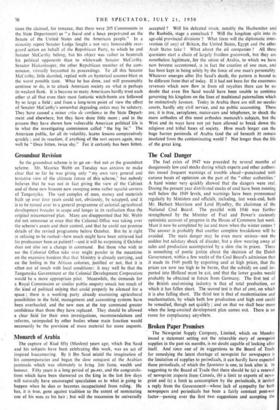Groundnut Revision
So the groundnut scheme is to go on—but not as the groundnut scheme. Mr. Maurice Webb on Tuesday was anxious to make clear that so far he was giving only " my own very general and tentative view of the ultimate future of this scheme," but nobody believes that he was not in fact giving the view of the Cabinet and of those new brooms now sweeping some rather squalid corners of Tanganyika. The vast complex of men, money and materials built up over four years could not, obviously, be scrapped, and it is to be turned over to a general programme of colonial agricultural development broader in scope and longer in its realisation than the original misconceived plan. Many are disappointed that Mr. Webb did not announce at once that the Colonial Office was taking over the scheme's assets and their control, and that he could not promise details of the revised programme before October. But he is right in refusing to be rushed—how much might have been retrieved had his predecessor been as patient!—and it will be surprising if October does not also see a change in command. But those who wish to see the Colonial Office take over might ponder in the meantime on the excessive burdens that that Ministry is already carrying, and on the feeling in the African colonies, justified or not, that it is often out of touch with local conditions: it may well be that the Tanganyika Government or the Colonial Development Corporation would be a more appropriate pilot. Meanwhile, the demands for a Royal Commission or similar public enquiry smack too much of the kind of political sniping that could properly be silenced for a space ; there is a working party already examining agricultural possibilities in the field, management and accounting systems have been overhauled, and the new men at the top command greater confidence than those they have replaced. They should be allowed a clear field for their own investigations, recommendations and reforms, unimpeded by other bodies whose main function would necessarily be the provision of more material for more inquests.


































 Previous page
Previous page